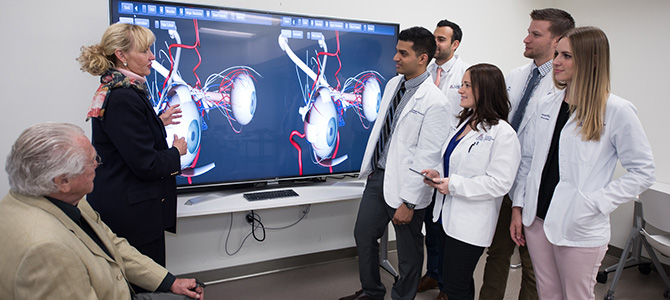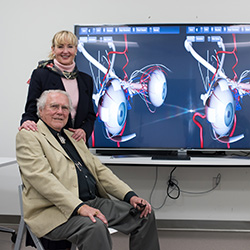
Generosity of Donor Brings Virtual Reality Ophthalmic Trainer to College

A state-of-the-art, virtual reality ophthalmic training simulator will be incorporated into the curriculum at the University of Arizona College of Medicine – Phoenix, thanks to the generosity of a longtime Arizona ophthalmologist.
Donald Miles, MD, and his wife, Judith, were among the first donors to the College in 2007, and they have continued to support the University of Arizona and its Phoenix medical school.
Dr. Miles and Mandi Conway, MD, interim chair of the Department of Ophthamology, recently showed the new 3-D trainer to students interested in pursuing a specialty in ophthalmology.

Dr. Conway credited former interim Dean Kenneth S. Ramos, MD, PhD, for giving the green light to bring the trainer to the College. “He said, ‘This is how kids learn’,” she noted of her meeting with Dr. Ramos. She is working with Rebecca Fisher, PhD, Anatomy Course director, and Marci Moffitt, MD, MPH, Doctoring Curriculum director, to incorporate the training into first-year studies.
“My hope as chair is to get ophthalmology into the curriculum, so that UA College of Medicine – Phoenix graduates know how to look at a red eye, whether it’s in an Emergency Department or a Primary Care doctor’s office, and know the right way to treat it.”
She said when most people have an eye problem, they go to urgent care or an emergency department. Many hospitals do not have an ophthalmologist on staff, and the emergency physician assumes the patient has pink eye. She hopes the trainer will give College of Medicine students awareness of other options for treating someone who comes in with a problem with their eyes.
“For me, it’s the visualization of the pathology of the eye,” she said. “You can see everything.”
Dr. Conway and her husband, Gholam Peyman, MD, who invented LASIK eye surgery, practice at Arizona Retinal Specialists in Sun City West. Dr. Conway specializes in treating macular degeneration, diabetic retinopathy, inflammatory eye diseases, retinal detachment and retinal surgery. They joined the UA College of Medicine – Tucson in 2006 as professors of ophthalmology and vision science and later moved to Phoenix to set up their practice.
Dr. Miles, who graduated from the University of Iowa College of Medicine and trained at Harvard and Baylor universities, has had a lifelong interest in education and volunteering.
“Technology has made advanced eye surgeries accessible and successful,” said Dr. Miles, a clinical professor at the College and the most senior ophthalmologist in Phoenix.
Dr. Miles co-founded the Arizona Foundation for the Eye in 1998. In 2002, the Foundation started the Arizona Telemedicine Ophthalmic Program in collaboration with the University of Arizona Telemedicine Program and the Mountain Park Community Health Center to provide diabetic retinopathy screening using digital transmission of eye images.
About the College
Founded in 2007, the University of Arizona College of Medicine – Phoenix inspires and trains exemplary physicians, scientists and leaders to advance its core missions in education, research, clinical care and service to communities across Arizona. The college’s strength lies in our collaborations and partnerships with clinical affiliates, community organizations and industry sponsors. With our primary affiliate, Banner Health, we are recognized as the premier academic medical center in Phoenix. As an anchor institution of the Phoenix Bioscience Core, the college is home to signature research programs in neurosciences, cardiopulmonary diseases, immunology, informatics and metabolism. These focus areas uniquely position us to drive biomedical research and bolster economic development in the region.
As an urban institution with strong roots in rural and tribal health, the college has graduated more than 1,000 physicians and matriculates 130 students each year. Greater than 60% of matriculating students are from Arizona and many continue training at our GME sponsored residency programs, ultimately pursuing local academic and community-based opportunities. While our traditional four-year program continues to thrive, we will launch our recently approved accelerated three-year medical student curriculum with exclusive focus on primary care. This program is designed to further enhance workforce retention needs across Arizona.
The college has embarked on our strategic plan for 2025 to 2030. Learn more.